|
|
|
Sort Order |
|
|
|
Items / Page
|
|
|
|
|
|
|
| Srl | Item |
| 1 |
ID:
183742
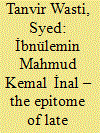

|
|
|
|
|
| Summary/Abstract |
İbnülemin Mahmud Kemal İnal was born in Istanbul as the son of a Pasha and, spending his entire working life as a bureaucrat, reached the highest levels in the Ottoman Civil Service. His career spanned the last years of the Ottoman Empire as well as the first decades of the Turkish Republic. As a result, he became uniquely qualified to write about people and events he had witnessed. He had a remarkably keen memory, and a high level of accomplishment in Arabic, Persian and French. With deep interests in literature, history, calligraphy, art and Turkish classical music, he almost became a one-man cultural institution. As a lifelong bachelor, he spent much time and effort in order to produce several encyclopaedic works on late Ottoman history, literature, music and culture.
|
|
|
|
|
|
|
|
|
|
|
|
|
|
|
|
| 2 |
ID:
192280
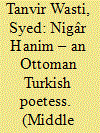

|
|
|
|
|
| Summary/Abstract |
The second half of the nineteenth century in the Ottoman Empire was a period when, with increasing literacy and education, combined with the growing role played by Turkish women in social and professional life, literary activity also registered a marked increase. Books, journals and newspapers in Turkish, and also in other languages, attracted high levels of readership. The article introduces the life and works of Nigâr binti Osman, certainly the most prominent female Ottoman Turkish poet of the closing decades of the Ottoman Empire. Over a hundred years after her death, interest in the life as well as the literary output of Nigâr Hanım remains high.
|
|
|
|
|
|
|
|
|
|
|
|
|
|
|
|
| 3 |
ID:
177268
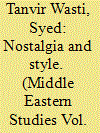

|
|
|
|
|
| Summary/Abstract |
Abdülhak Şinâsî Hisar, a famous writer whose active career may be said to have spanned over the first 60 years of the 20th century, is celebrated within Turkey for his inimitable prose style, steeped in nostalgia and expressed with great elegance and charm. His three short novels, based both on his childhood memories of life and on depicting characters he observed in an Ottoman capital that once had a sparkling civilization, and his biographies of major writers who were his friends, along with his essays on literary criticism and his prolific journalistic output, have assured him a place in the front rank of Turkish literary figures.
|
|
|
|
|
|
|
|
|
|
|
|
|
|
|
|
| 4 |
ID:
180291
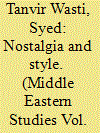

|
|
|
|
|
| Summary/Abstract |
Abdülhak Şinâsî Hisar, a famous writer whose active career may be said to have spanned over the first 60 years of the 20th century, is celebrated within Turkey for his inimitable prose style, steeped in nostalgia and expressed with great elegance and charm. His three short novels, based both on his childhood memories of life and on depicting characters he observed in an Ottoman capital that once had a sparkling civilization, and his biographies of major writers who were his friends, along with his essays on literary criticism and his prolific journalistic output, have assured him a place in the front rank of Turkish literary figures.
|
|
|
|
|
|
|
|
|
|
|
|
|
|
|
|
| 5 |
ID:
174147
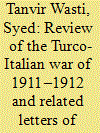

|
|
|
|
|
| Summary/Abstract |
From the time of the 1877 Turco-Russian war till its disappearance from the stage of history in 1922, the Ottoman Empire was involved in decades of almost continuous war – in Europe, on the Russian front and in the Middle East. The conflict with Italy of 1911–1912 was an example of how powers in decline are forced into war in the face of peremptory demands from stronger neighbours. Italy's unprovoked attack on the Ottoman provinces of Libya in North Africa paved the way for the Balkan Wars of 1912–1913 and indirectly also hastened the First World War. A group of Ottoman Turkish military officers along with their Arab and Berber Muslim allies in Libya made a heroic defensive stand and kept the Italian naval invasion pinned to the coastal beach-heads of Libya.
|
|
|
|
|
|
|
|
|
|
|
|
|
|
|
|
|
|
|
|
|